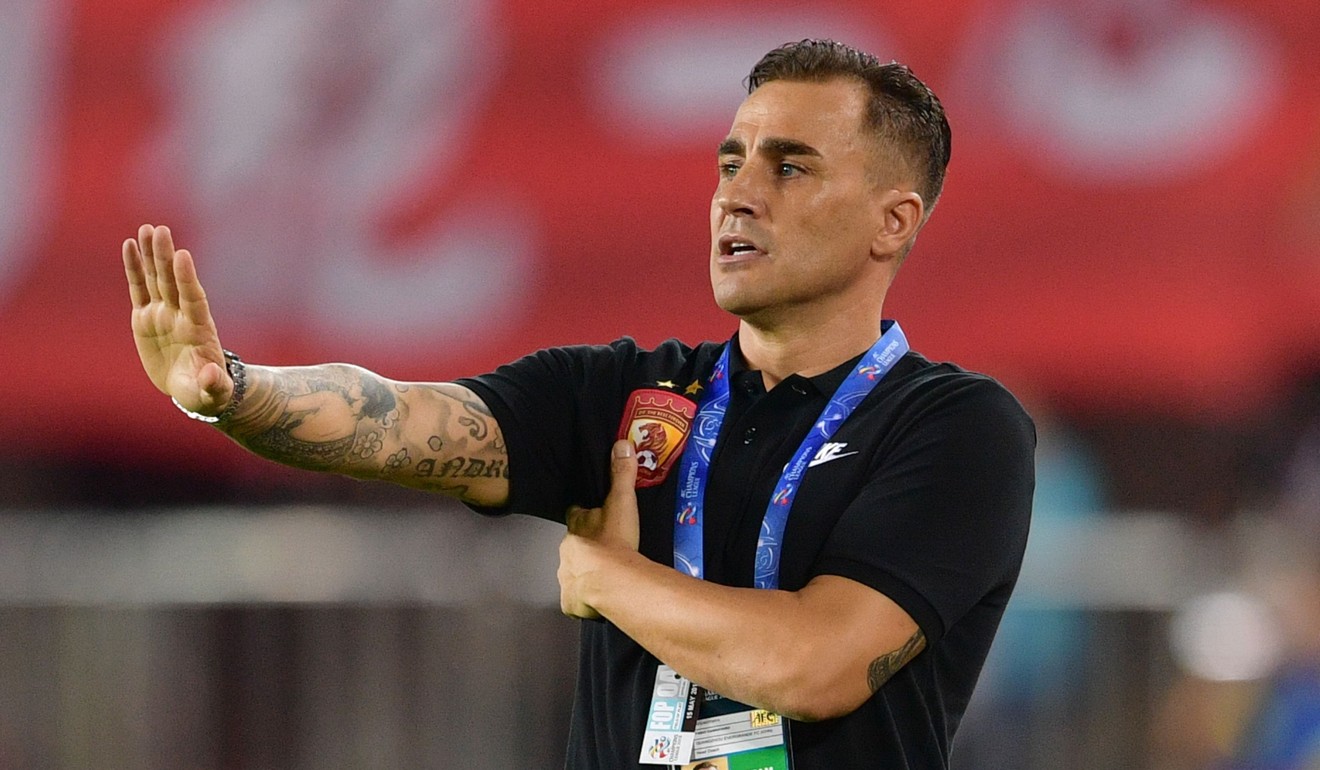Tianjin Tianhai officially announced they are looking for a buyer, who could take the club for free, whose estimated value is between ¥647.72m to ¥771.71m($93.4m to$111.3m). But the club may have huge debt. In addition they are still in a legal dispute with Anthony Modeste. pic.twitter.com/NoYrTfNQoP
— Titan Sports Plus (@titan_plus) March 5, 2020
Chinese Super League’s Tianjin Tianhai available for ‘free’ amid football finance meltdown
- Shenzhen reported to take CSL spot if Tianjin Tianhai cannot find new owner and fulfil Chinese FA requirements
- Dramatic fall from grace for side that reached AFC Champions League quarters with Alex Pato and Axel Witsel

If you fancy yourself as the next David Beckham, Elton John or perhaps petro-state royalty then you’re in luck. You, too, can become the owner of a top-flight football club.
Chinese Super League side Tianjin Tianhai are up for sale. Well, that’s not quite right, the 2018 AFC Champions League quarter-finalists are actually available for free. Nothing. Gratis.
The Tianjin Football Association said last week it will transfer the rights to whoever can take them on, with several companies reported by local media as being interested.
“The club have reached a critical moment and in order to maintain the hard-fought position in the Chinese Super League, have, after careful considerations, made a difficult decision,” read a statement on the club’s official social media channels. “We will transfer 100% of the club with zero fee.”
There is a catch to getting a club that was valued at some 700 million yuan (US$100 million) for nothing. They come in the form of a reported US$145 million debt, although how much any new owner would be liable for was “negotiable”.
There are also several disputes hanging over the club with former coaches and players seeking payouts, including Fabio Cannavaro, Paolo Sousa and Anthony Modeste, who returned to German Bundesliga side Cologne amid claims of contract breach.

These are hangovers to some extent of the freewheeling days when the club was called Tianjin Quanjian and owned by pharmaceutical giant Quanjian. Chairman Shu Yuhui’s fall from grace ended in a nine-year prison sentence for a pyramid scheme and the club’s days of attracting players like Alex Pato and Axel Witsel was over.
The Tianjin FA stepped in, renaming the club Tianhai, last season. Now they understandably want someone else to foot the bill.
Though Tianjin Tianhai are free for sale, there are huge amount of debts for the buyer to clean off. According to Chinese media, Tianjin Tianhai are accused of owing salary by former employees, including Choi Kang-hee, Vanderlei Luxemburgo, Paulo Sousa & Anthony Modeste. pic.twitter.com/YQfzZhudK8
— Titan Sports Plus (@titan_plus) March 6, 2020
This is made all the more complicated by the Chinese Football Association’s request that the club file papers with them to prove they can play (and more importantly pay) over the coming two seasons. The deadline to file is 5pm on Thursday, February 12, while the club’s own deadline to find a “buyer” has a deadline of a day later.
There may be a last-gasp reprieve from either one of the interested parties – although time is tight – or the CFA itself, given that there is no Chinese Super League to play, with the new season postponed indefinitely amid the coronavirus fight.
Coach Li Weifeng was confident enough to dismiss rumours that the side would not be in the CSL next season after staying up in 2019.

“Such rumours are very irresponsible and disrespectful to the players who tried so hard last season,” the former Everton defender told Tencent Sports. “The club is facing some problems, but they can be solved.
“And some are questioning why we did not sign new players. There’s no rule that a team must sign somebody during a transfer window.”
Tianhai have lost 13 players in the close season – eight of them expired loans – while no new recruits have come in.
“Every team has its own troubles, that’s normal. That doesn’t mean the club has no future,” Li said, noting that Tianhai’s situation was different to other clubs where players have gone unpaid.

Still, Friday the 13th could be a nightmare for Tianjin Tianhai. More worryingly, the true horrors for Chinese football could be yet to come.
While it is unusual for teams in the CSL to risk disappearing completely, the same cannot be said for China’s lower leagues.
Stalwarts Liaoning Whowin are also in trouble and looking for a new owner, while the list of clubs that have left the league since the start of last season stands at nine – three in League One and six in League Two. None could prove they had fully paid players and staff in 2019. The futures of another three clubs are reported to be in doubt.
It is expected that Shenzhen, who were relegated from the CSL last season after finishing four points behind Tianhai, will replace them. Coupled with Liaoning’s expected demise, Sports Weekly reported that the CFA asked six League Two teams to prepare the documents to move to League One. The second tier was meant to expand to 18 teams from 16 this season, but instead teams are dropping like flies.
The large amounts of wages and taxes owed in the second and third tier has damaged the foundations of the professional football pyramid.
How did it come to this? The financial frenzy at the top end of the league forced everyone to spend to keep up and that went down the leagues.
Chinese footballers are paid well over the odds in China, where only a limited number of foreigners are allowed. That – and the money paid to foreigners, some of whom are among the top earners in the world – means that clubs spend fortunes with little commercial revenue in return.
Huge transfer fees were curbed by introducing a transfer tax and other rules have followed in an attempt to curtail spending and make clubs operate within their own means, but it is too little, too late.
It has all hit the medium-term goal of football’s 2015 action plan, “the professional league organisation and competition level has reached the top in Asia”.
That, like a future for Tianjin Tianhai, seems a long way off.